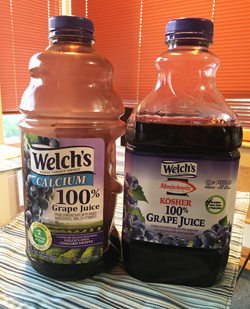By Donald H. Harrison


SAN DIEGO – After the blessings over the candles, grape juice, and bread, my wife, two of my grandsons, and I carefully sipped another glass of Welch’s Calcium 100% Grape Juice. In imitation of wine connoisseurs, we then cleansed our palates with water and availed ourselves of the new Welch’s Manischewitz Kosher 100% Grape Juice.
Reactions were almost immediate. The new grape juice was far less sweet, less cloying, than the old, according to Nancy, grandson Shor, 14, as well as my own evaluation. We liked it better.
Sky, 9, on the other hand, preferred the sweeter Welch’s Calcium 100% Grape Juice.
So, families with younger children may not enjoy the new joint Welch’s-Manischewitz brand as much. But those families with older children—or those populated only by adults—may prefer the latter.
Both are made from Concord Grapes. Discerning the difference from the labels came in a close reading of the nutritional information.
The labels for both the Calcium 100% Grape Juice and the Kosher 100% Grape Juice said that a serving of eight fluid ounces would yield 140 calories, O grams of fat, 15 milligrams of sodium, 36 grams of sugars, one gram of protein, and a total of 38 grams of carbohydrates.
According to the nutritional chart, the Welch’s Calcium 100! Grape Juice had 100 percent of the daily allowance for Vitamin C, 10 percent calcium; 6 percent magnesium, 15 percent manganese while being an insignificant source of fat calories, saturated fat, trans fat, cholesterol, fiber, vitamin A, and iron.
In contrast, the combined-Welch’s Manishewitz Grape Juice’s nutritional chart reported the drink was an insignificant source of Vitamin C, accounted for 2 percent of the daily calcium allowance, and made no mention of either magnesium or manganese. Like the Welch’s drink, it also reported the drink to be an insignificant source of fat calories, saturated fat, trans fat, cholesterol, fiber, Vitamin A, and iron.
Reading down to the bottom of the label, we found that both varieties listed as ingredients grape juice from grape concentrate, grape juice, and citric acid. However, Welch’s Manischewitz Kosher 100% Grape Juice listed grape juice first, and concentrate second; whereas with the Welch’s Calcium 100% Grape Juice, the listing was the other way around, meaning it had more grape concentrate in its formula than the Welch’s Manischewitz variety.
The Welch’s Calcium 100% Grape Juice listed the additional ingredients of calcium gluconate, calcium lactate, and ascorbic acid (Vitamin C).
When they announced their special partnership in February, Manischewitz and Welch’s proclaimed that they “bring nearly 275 years of kosher experience and grape juice expertise. Manischewitz’s president and CEO, David Sugarman, said: “With Welch’s expertise in Grape Juice combined with Manischewitz leadership in Kosher, we are thrilled to offer consumers a quality product from two well respected brands.”
Judge for yourselves. We did.
*
Harrison is editor of San Diego Jewish World. He may be contacted via donald.harrison@sdjewishworld.com. Comments intended for publication in the space below must be accompanied by the letter-writer’s first and last name and by his/her city and state of residence (city and country for those outside the United States.)